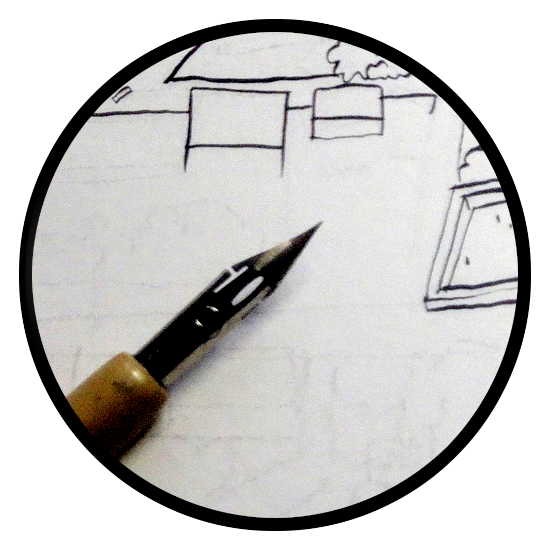If you keep practicing, you’ll get faster at it. There was a famous reddit user that would do water color paintings of various posts as practice, and his work and speed greatly improved over time.
Get used to imagining points to reference your strokes. With the arm, once focus is placed on things such as the wrist in relation to the forearm, to the relation of the wrist to the thumb bone, etc.
What helped me a great deal was Burne Hogarth books on Dynamic Figure Drawing. The illustrations are secondary to the text, which explains methodology very well in a concise yet informative format.For what you’re asking, I’d recommend his book on Dynamic Hands. Hands are surprisingly difficult to draw for a lot of people, however Hogarth’s teachings helped me speed up my drawings whilst allowing me to mould them to my style in a much nicer way.
I’d suggest using a lighter pen (or less pressure) so you can add a final linework on top of it later. Currently, it’s hard to make out some parts, like the knuckles, because you’ve drawn so many times over them.
yeah ive noticed it have an issue with that, sometimes i manage to draw lighter but most times it ends up like this
I’d suggest looking into pencil hardness, they have different shades by default. A mechanical pen would also help since it’s thinner.
I’d go the other way and make a bunch of loose sketches with charcoal or conte.
i already have a quite good mechanical pencil, i think its just me
Swap the lead for something harder like 2H or above? I have a hard time with pressure also.
Practice drawing basic shapes, then learn to break your drawing into said basic shapes, and adding detail from there.
Most folks will probably tell you to try “being more confident” with your lines, but you’re in the learning process, you can focus on that later. If you want to get started on that now, then just try drawing basic shapes in as few lines as possible.
Right now it seems like you’re trying to extract an image out of your scribbling. Almost like you’re trying to ‘find’ the art in the “marble slab.”
You should take a life drawing class. The classes start with ‘gesture drawings’ where the model will pose for 30 seconds and the move to a new pose. The idea is to warm up by capturing the essence of the form quickly. You don’t worry about what it looks like, your going for the feeling. Then you’ll move to 1 minute poses, then 5 minutes ect. You blurt down the base and add details as time permits.
You’re too uptight and worried about the end product right now. Pump that shit out and don’t get locked into perfection paralysis.
Yea this isnt quite how the wrist bends, this would hurt. That thumb is beautiful. The fingers are quite good.
Your linework seems very uncertain. Like you are repeatedly drawing the same line, searching for the correct one.
DrawABox.com 's first lesson is all about how to make marks on paper. It’s builds control and confidence with a bunch of abstract exercises. Once you have confidence in your ability to make a mark, focus on your line weight. Unless it’s a style you are going for, you make your gesture and proportion guides very lightly so they are easy to erase and improve. Then, once you have your guides how you want them your final lines are long, smooth dark marks.
Imagine you’re final lines will be in ink. (Maybe even actually use ink, DrawABox asks that you buy ink fineliners for their course)
As others have said, they hand itself is quite good. The forearm however lacks musculature. It’s very flat. Do a few studies of the underlying bones and some more of the muscles on top. If you know how the bones and muscles behave you can draw anything. I’ve found these websites very helpful:
- https://doctorlib.info/anatomy/classic-human-anatomy-motion/7.html
- https://sketchfab.com/3d-models/merged-latisimus-dorsi-15e536e8ca774054b66fea8445def9cb
And, of course, as you practice you will get faster.
deleted by creator




